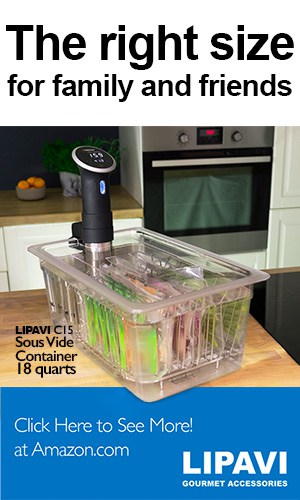-
Sous Vide Time and Temperatures
Sous Vide Time and Temps
Sous Vide Time and Temps
Sous Vide Temps
- All Sous Vide Temperatures
- Sous Vide Beef Temperatures
- Sous Vide Chicken Temperatures
- Sous Vide Duck Temperatures
- Sous Vide Fish Temperatures
- Sous Vide Vegetables Temperatures
- Sous Vide Infusions Temperatures
- Sous Vide Lamb Temperatures
- Sous Vide Pork Temperatures
- Sous Vide Shellfish Temperatures
- Sous Vide Turkey Temperatures
- Recipes Recipes Recipes Recipes
- Getting Started Guides Getting Started Guides Getting Started
- Equipment and Tools Equipment and Tools Equipment Equipment and Tools
- More Resources More Resources Resources More Resources
Sous Vide Machines: What is Best For You?
More Modernist Equipment
•
Sous Vide Equipment • Sous Vide Machines
Click here to get great sous vide content via email
This post may contain affiliate links. Read more.
Written by Jason Logsdon
There are many different types of sous vide machines available for the home and professional cook but they all have one purpose: to keep the cooking temperature consistent. They do this in different ways and each way has pluses and minuses.
What To Look For
When choosing a sous vide machine there are a few things to look for. People will weigh each factor differently but each one comes into play when deciding on a which sous vide machine to purchase.

Versatility and Ease of Use
Because of the differences in how the sous vide machines work there are distinct trade offs for each type. The ability to use the machine in different containers, easily control and change the temperature, and thoroughly clean and put it away are all big factors when choosing a sous vide machine.
What Does it Cost
While it doesn't affect the cooking itself, the price of the machine is important to most people. You don't want to spend $1,500 if a $200 machine will get the job done for you just as well. And if you are on a budget you might be willing to forgo WiFi in order to save some money.
Stability of Temperature
Temperature stability is the most important factor as far as the cooking process itself goes. Techniques range from a variation of several degrees to as small as 0.1°C. Another factor here is how quickly a machine can bring the water back up to temperature when cold food is added. Most sous vide machines are pretty stable but it's worth keeping in mind.
Heating Speed
For some people the amount of time it takes to get the machine up to temperature is very important. There is a wide range in the heating times of sous vide machines with some taking up to twice as long as others.
WiFi and/or Bluetooth
More and more sous vide machines are including WiFi and Bluetooth in their units. For some people this is a must-have feature and other people don't really care. If you are unsure you can learn if you need WiFi on your sous vide machine.
Types of Sous Vide Machines
There are a wide range of sous vide machines but most fall into one of a few groups.
Sous Vide Immersion Circulators

Immersion circulators consist of a heating element and a water pump that combine to heat and circulate the water, keeping it a very consistent temperature. The immersion circulators can be used with almost any container of water, from stock pots to plastic tubs up to 5 gallons or larger in size. This versatility is often nice, letting you cook a small amount of food in a small pot and only needing the larger sizes when cooking for a lot of people which helps save energy costs and speeds up the heating process.
Immersion circulators also have the best temperature stability of all the sous vide machines. Most machines keep it to within 1°C and many are even more stable. The pump part of the machine also helps ensure the water is evenly heated, eliminating hot and cold spots. The majority of immersion circulators heat the water very quickly as well.
Immersion circulators used to be very expensive but lately the prices have been dropping as new machines enter the market, pushing the prices from over $1,000 down to as low as $100. Because of this, I highly recommend getting an immersion circulator if you are getting serious about sous vide cooking.
The top of the line circulator is probably the PolyScience Professional Chef Series which is used in many of the top restaurants in the world and costs around $800. Unless you are in a professional kitchen it is probably overkill.
For home cooks, there are many great options that are less than $200. Our top picks are the ChefSteps Joule, the Anova Nano and Anova Precision Cooker WiFi 900. They are all excellent machines and you can't go wrong with any of them.
For a detailed look at the different circulators you can check out our Sous Vide Machine section.
Sous Vide Water Baths

Sous vide water baths are basically a self-contained temperature controller and heater with a set water bath. They used to be more popular when laboratory-grade equipped was commonly used for sous vide cooking. Now the most common water bath is made by Sous Vide Supreme, which runs $300 to $450.
In general, water baths are bulkier than immersion circulators and they are more expensive than the new line of inexpensive immersion circulators. Due to the built-in bath size you also have limited options for the size of container you will be using. Because there is no circulation mechanism in the water baths they tend to be less precise than immersion circulators but they still are usually good enough for sous vide cooking.
On the plus side, because they are self contained they are very easy to use. They also can do things that stick circulators can't do, such as make stocks and poach in oil or butter. If this is important to you, then the Sous Vide Supreme will do a great job and you'll get your money's worth.
Stove-Top and "Beer Cooler" Sous Vide
Stove-top and "beer cooler" sous vide are the cheapest and easiest ways to check out sous vide. They use a stove to bring the water up to temperature and then either a stove or a beer cooler to hold the temperature of the water consistent while the food cooks.
It can be a very convenient (and free!) way to test out sous vide and it usually works well, especially on cooking times of a few hours or less. Longer cooking times can be very difficult to do, particularly multi-day times. It's also the least consistent way to do sous vide and the temperature is hard to accurately maintain. It's a good first step for someone interested in sous vide.
Sous Vide Temperature Controllers
Sous vide temperature controllers use a crock pot or rice cooker to heat the water while a device regulates the temperature. Basically, a temperature controller works by turning the crock pot on and off to keep the water temperature stable.

Sous vide temperature controllers are pretty easy to use, especially if you already have a good crock pot or rice cooker. They used to be the best low-cost method of trying out sous vide but the advent of less expensive immersion circulations has pushed them into the background.
Most sous vide temperature controllers are $100 to $200. While I recommend an immersion circulator over any of these, if you are interested in a temperature controller both the Dorkfood and SousVideMagic are a good choice. They both are highly thought of and have been used by many people.
What type of sous vide machine do you use?
Have questions or comments about sous vide machines?
Let Me Know on Facebook or in the comments below!
Have questions or comments about sous vide machines?
Let Me Know on Facebook or in the comments below!
 This article is by me, Jason Logsdon. I'm an adventurous home cook and professional blogger who loves to try new things, especially when it comes to cooking. I've explored everything from sous vide and whipping siphons to pressure cookers and blow torches; created foams, gels and spheres; made barrel aged cocktails and brewed beer. I have also written 10 cookbooks on modernist cooking and sous vide and I run the AmazingFoodMadeEasy.com website.
This article is by me, Jason Logsdon. I'm an adventurous home cook and professional blogger who loves to try new things, especially when it comes to cooking. I've explored everything from sous vide and whipping siphons to pressure cookers and blow torches; created foams, gels and spheres; made barrel aged cocktails and brewed beer. I have also written 10 cookbooks on modernist cooking and sous vide and I run the AmazingFoodMadeEasy.com website.
Affiliate Disclaimer: Some links on this site might be affiliate links that if used to purchased products I might receive money. I like money but I will not endorse something I don't believe in. Please feel free to directly go to any products I link to and bypass the referral link if you feel uncomfortable with me receiving funds.













